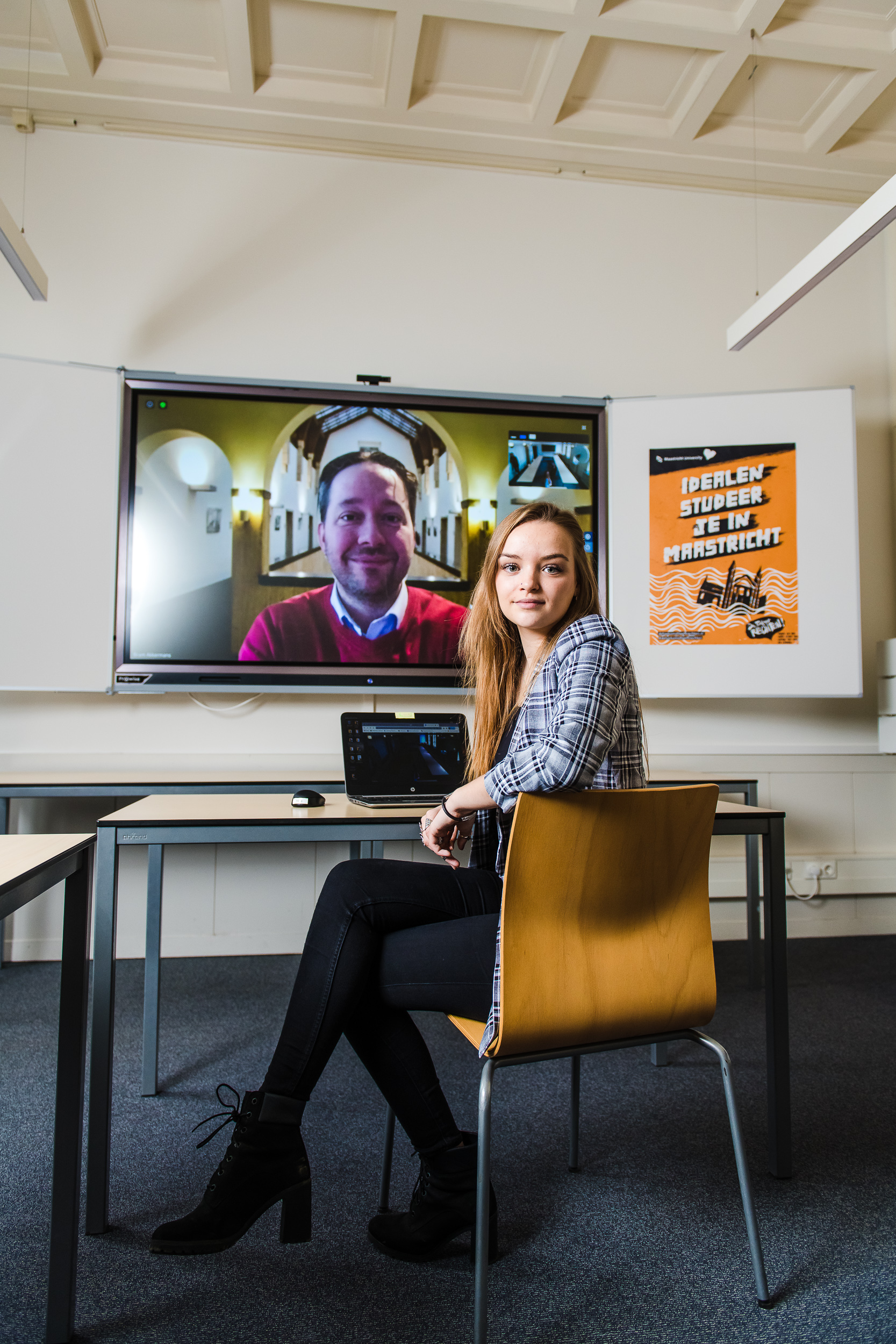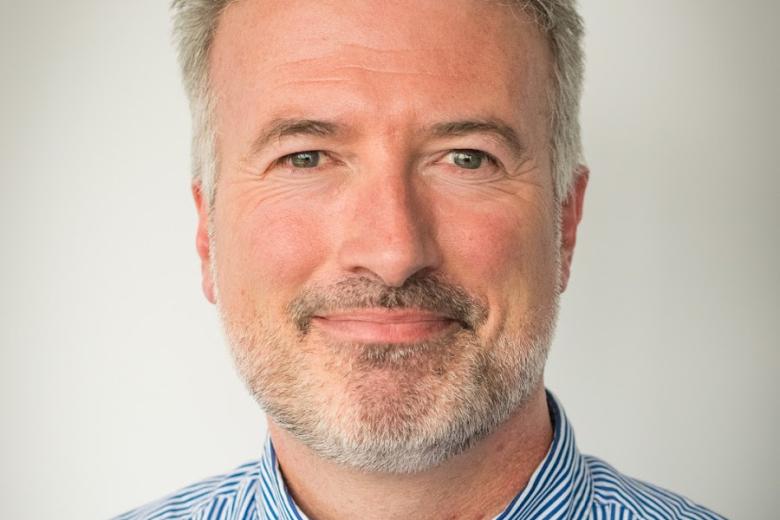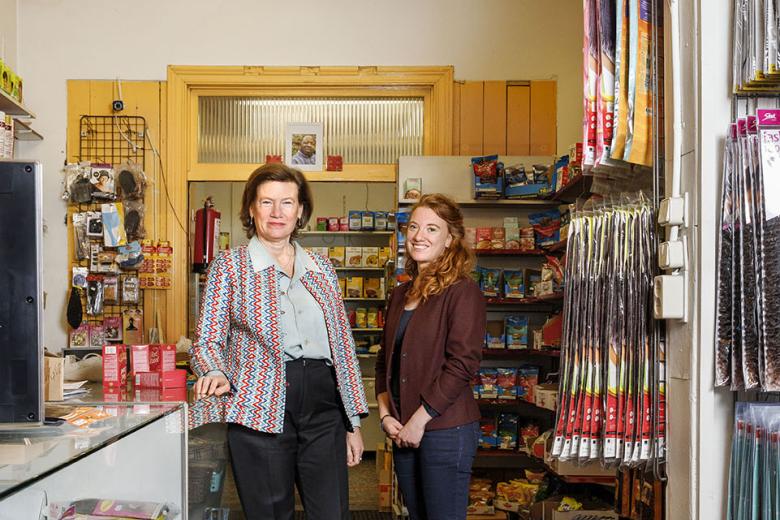Going ‘back to our core DNA’ with new curriculum for the bachelor’s in Law
It was a long-held desire: redesigning the curriculum for the bachelor's programme in Rechtsgeleerdheid (Law).' It is a return to the thematic approach, but in a 21st century context. There are no more short cases, but one big project per semester that involves the different types of law. After two years of planning and designing the curriculum, it finally went from the drawing board to the (virtual) classroom in August 2020. Bram Akkermans, associate professor and project leader of the curriculum redesign: “Now, colouring in the picture has begun. And fortunately—befitting of an unconventional faculty—colouring is also being done outside the lines.”
The Faculty of Law got off to quite an unconventional start in 1981. A year before Maastricht University got the green light, experts started developing the curriculum. “The approach at the time was quite radical”, explains Bram. “The faculty’s founders were focused on innovation; PBL was a new teaching method and the curriculum was primarily thematic. Through the years, there have been several redesigns of the curriculum to implement the latest and greatest developments in the field, and it slowly became more and more subject-oriented.”
Continuing to push the boundaries
That is, until 2018. Then, the new strategic plan for the faculty was presented and it provided
room for redesigning the bachelor’s curriculum. “We want to return to our core DNA, back to the thematic approach of the early years. An additional advantage of this is that some of our current teaching staff experienced this approach when they studied in Maastricht themselves. Because of this, we know what worked and what didn’t work. We can learn from mistakes that were made previously and overcome them.”
Bram was asked to be project leader. “My first reaction was: are you sure? I am known for my progressive stance on change in legal education. Of course, I abide by all the decisions and there are national rules that have to be followed, such as ‘civil effect’, which gives graduates access to the robed professions. Those are the lines I don’t cross. And we are working enthusiastically within these boundaries. But others we are trying to push.”
He compares the development of the revised bachelor’s curriculum with SpaceX, the space transport company of Elon Musk. “Of course, we make sure that nothing explodes, but the goal is for that rocket to go up into the air. We achieve this best through co-creation. We redesigned the bachelor's programme in a small group, but colleagues from every part of our organisation are involved in its further development.” The project leader is confidently open to everyone’s suggestions.
Corona provides an extra dose of chaos
In the summer of 2020, the planning and design were completed and there was time to pause for a moment. “We’ve arrived”, was Bram's first thought. However, there was still plenty to do and trying times were ahead. The coronavirus pandemic created an extra dose of chaos, but he sees responding to it as one of the most enjoyable things he has ever done. “How often do you get this chance? Hardly ever. And the fact that we essentially had carte blanche was the greatest gift.”
Bram is proud of how everyone came together and is impressed by how certain qualities have emerged in some of his colleagues. “Sometimes I’m suddenly surprised by a colleague whom I had seen in a different way earlier—someone who excels in coaching, for example, or has a talent for making teaching videos that gets all of the students talking and saying, ‘Wow, these are great!’. That is really special to see. By diversifying tasks, people can develop certain other talents.”

Integrating ideals and societal challenges
One subject that comes to the fore, particularly in the campaign surrounding the revised bachelor's curriculum, is ideals. “We started thinking about this after sitting down with marketing. We talked about the bachelor’s programme and they held up a mirror to us: this is what it’s about. Ideals. That doesn’t mean that we think everyone should be an activist, but our students want to be connected to the world around them. And that is a bit controversial. Law is predominantly a normative study. For other faculties, values don’t come into play as much. But the future generation of law students are the climate strikers of today. They want to make an impact in the world. That fits in perfectly with this bachelor's programme.”
The thematic approach is also more in keeping with working life, according to Bram. “The four themes—sustainability, technology, migration and security—fit into the strategy and the various research specialisations within the faculty. They are the major societal challenges of today. In the second year, these themes serve as a framework to help students learn to cooperate more and in different ways with other disciplines, such as criminology and psychology. They learn to communicate better, to give and receive feedback, and to become world citizens. In that
sense, too, we are addressing the needs of society.”
Initial reactions to the new curriculum
Meanwhile, the first year has started and the second year is being planned. “We’re hearing more from the students about their experiences. We intentionally built in feedback opportunities. And that has already resulted in a lot of interesting things. For example, we thought that the students would change tutorial groups every six weeks. This would give them the opportunity to try out different roles. Because of corona, however, students find it more enjoyable to stay together after those six weeks. So we’ve adjusted that. It requires a lot of planning and administration, but it’s possible.”
Fleur Aben is a first-year student: “The PBL, in particular, appealed to me. “I knew that I was going to follow a newly overhauled bachelor's degree and I was a bit unsure about how well organised it would be. But I haven’t once regretted my decision. Sometimes it can be a bit tough to keep an overview when you’re discuss one huge case that involves so many different areas of law”, according to Fleur. “But they do indeed listen very carefully to our feedback. We have a fantastic tutor; she really goes the extra mile for us. And if you send Bram an email, he always takes up the matter. The other day, they even sent out a poll about a certain issue. I've never experienced that. I have a lot of respect for it.”
Fleur talks enthusiastically about the project she has been working on over the past few months. Where previously a new case was introduced every week, students now work on one major case for an entire block. “We have to organise a big music festival that takes place after corona. Every week, there are other issues at play, which keeps it exciting. Then, the toilets won’t be delivered or the food trucks will be stolen. This way, we cover different areas of law. It feels like a real case.”
The teachers also give us their feedback. Bram: “Because of the corona measures, we formed three groups of five students for the professional development course instead of one group of 15 students. However, the workload was too heavy for our colleagues. They ultimately have to supervise a group three times as often.” Fleur can confirm that. “We now have to turn in something almost every week. The advantage is that you can earn your grades in a number of ways, but it also involves a lot of follow-up work for the teaching staff.”
A lot to look forward to
The current corona pandemic requires a different way of working. Add to that a newly redesigned bachelor’s curriculum and of course you hear some grumbling here and there. “It’s not easy, either”, says Bram. “I really feel bad for the students, but I listen to them. We remain open to change.”
Fleur enjoys it anyway: “I’ve really found my place in this study. Sometimes it doesn’t even feel like studying. Because of corona, some things are a bit more difficult, which is a pity. But the teachers do their best. They do keep me engaged. Every Sunday evening, I look forward to the next week.” Bram adds, “I like to see that it’s still widely accepted, so I am moderately positive. After all, we are only halfway there. In a few months, we can really look back on an entire first year.” Indeed, there is a lot to look forward to.
By: Karin Somers (text) Casey O'Dell (translation) and Jonathan Vos (photography).
| Return to lawreview2020 |

Would you like to know more about
how we integrate ideals and societal challenges in our education? Are you curious about the use of modern technology in our education?
Visit detoekomstheeftrechten.nl
to find out more.
Also read
-
Maastricht University and YERUN - A recap and a glimpse into 2024
Maastricht University is an active member of the Young European Research Universities Network, championing values of innovation, openess and responsibility.

-
Empowering Smallholder Farmers in the Data Economy: Unlocking Opportunities and Overcoming Obstacles
Frederik Claasen, the head of policy at our partner organisation Solidaridad Network on the opportunities and obstacles facing smallholder farmers in their data ecosystems.

-
How do involuntarily returned migrants fare in Senegal?
The PhD research of Karlien Strijbosch focuses on Senegalese migrants who were forced to return home after a stay in Europe. Doing justice to such stories is no easy feat, especially when you come up against walls of silence, distrust and shame. Strijbosch and her supervisor Valentina Mazzucato...

